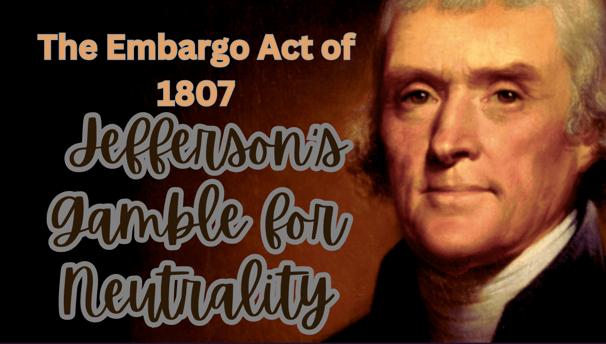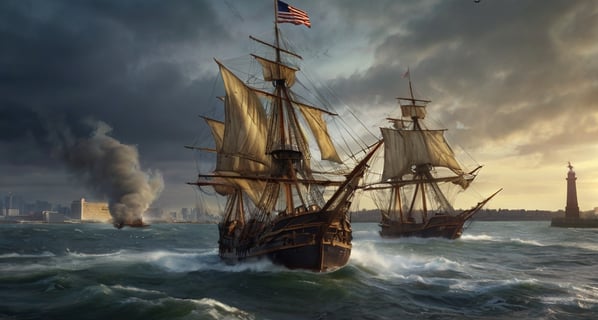The Embargo Act of 1806: Jefferson's Gamble for Neutrality and Its Unintended Consequences
In the early 19th century, as the young United States sought to establish its place on the world stage, it found itself caught between two warring European powers: Great Britain and France. The Embargo Act of 1806, championed by President Thomas Jefferson, was a bold attempt to assert American neutrality and avoid direct conflict. However, this well-intentioned policy would ultimately lead to dire economic consequences and tarnish Jefferson's presidential legacy.
Casey Adams
7/3/20244 min read


Introduction:
The Embargo Act of 1807 was a pivotal yet controversial piece of legislation enacted by the United States Congress under President Thomas Jefferson.
Aimed at asserting American sovereignty and neutrality amidst the global turmoil of the Napoleonic Wars, the Act sought to pressure Britain and France into respecting American rights by prohibiting trade with all foreign nations.
While it was ambitious in scope and intent, the Act's economic and political consequences reverberated across the young republic and contributed to mounting tensions that eventually culminated in the War of 1812.
Background: A Nation Caught in Global Conflict
During the early 19th century, the Napoleonic Wars dominated global politics.
As Britain and France vied for supremacy—Britain ruling the seas and France dominating the continent—both powers sought to undermine the other's trade.
Neutral American shipping became an unintended casualty of this struggle.
Britain implemented its Orders in Council, mandating that neutral ships (including American vessels) trade first through British ports before continuing to France or its allies.
In retaliation, Napoleon’s Continental System declared a blockade against British goods, effectively trapping American merchants between two hostile powers.
Adding to the outrage, Britain’s Royal Navy routinely impressed American sailors, forcibly recruiting them into service on the pretext that they were British deserters.
This practice, seen as a flagrant violation of U.S. sovereignty, culminated in the infamous Chesapeake–Leopard Affair in June 1807.
When the British warship HMS Leopard fired upon and boarded the USS Chesapeake off the coast of Virginia, seizing four sailors, public outrage soared, and calls for decisive action against Britain intensified.
Jefferson's Solution: The Embargo Act
President Jefferson, a staunch advocate of nonviolent resistance and economic leverage, sought to avoid outright war with Britain or France, recognizing America’s military inferiority.
Instead, he proposed a strategy of "commercial warfare," hoping to use economic sanctions to coerce the belligerent powers into respecting American neutrality.
Congress, dominated by Jefferson’s Democratic-Republican allies, passed the Embargo Act on December 22, 1807.
The Act imposed a sweeping ban on all American exports to foreign nations and restricted imports, effectively halting international trade.
Jefferson believed that denying Britain and France access to American goods—particularly agricultural staples like cotton and grain—would pressure them into changing their policies.
Implementation and Challenges
While the Embargo Act was bold in design, its enforcement proved problematic.
Loopholes in the legislation and widespread evasion by American merchants undermined its efficacy. Smuggling flourished, particularly in New England, where ports depended heavily on international trade.
State and local officials often turned a blind eye to violations, exacerbating tensions between federal and state authorities.
The embargo also failed to inflict the intended economic damage on Britain or France. Britain, leveraging its global trading networks, found alternative markets in Latin America and elsewhere.
Meanwhile, France, insulated by Napoleon’s Continental System, suffered little from the absence of American trade.
Instead, the Act devastated the U.S. economy, particularly in maritime states like Massachusetts and Rhode Island, where unemployment and economic hardship soared.
Domestic Consequences
The Embargo Act quickly became one of the most unpopular policies of Jefferson’s presidency. Critics, especially Federalists, lambasted the Act as an overreach of executive power and a disastrous economic policy.
Opposition was particularly fierce in New England, where merchants and shipowners saw their livelihoods destroyed.
Public protests, evasion of the law, and political backlash highlighted the deep divisions the embargo created.
Paradoxically, the embargo did spur some unintended benefits.
The absence of imported goods encouraged the growth of domestic manufacturing, laying the groundwork for America’s industrialization.
The textile industry, in particular, began to flourish as Americans turned to domestic products to fill the void left by the embargo.
Repeal and Aftermath
Recognizing the Act's failure and the growing domestic unrest it provoked, Congress repealed the Embargo Act in 1809, replacing it with the Non-Intercourse Act.
This new legislation lifted trade restrictions with all nations except Britain and France.
However, it did little to ease tensions, and the underlying issues of impressment and trade interference remained unresolved.
The embargo's failure underscored the limitations of economic coercion as a tool of diplomacy and highlighted the challenges faced by a neutral nation caught in the crossfire of global conflict.
The unresolved grievances with Britain would escalate into the War of 1812, marking the first major test of American sovereignty on the world stage.
Legacy of the Embargo Act
The Embargo Act of 1807 remains a significant, albeit controversial, chapter in American history.
It showcased Jefferson’s willingness to experiment with innovative policy solutions but also highlighted the complexities of balancing economic strategy, diplomatic objectives, and domestic stability.
While the Act failed to achieve its immediate goals, its broader consequences—particularly the stimulation of American industry and the intensification of regional and political divisions—left a lasting impact on the nation.
By attempting to leverage economic might over military confrontation, the Embargo Act offered an early lesson in the challenges of economic warfare, a lesson that resonates in international relations to this day.
For more detailed information, you can explore the Wikipedia article on the Embargo Act of 1807.1



